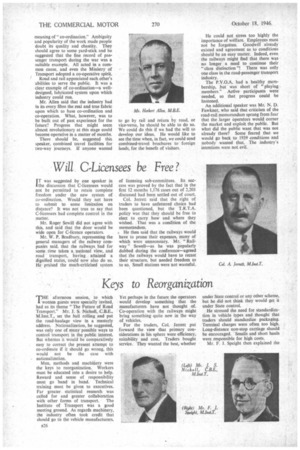Will. Clicensees be Free?
Page 32

If you've noticed an error in this article please click here to report it so we can fix it.
T was suggested by one speaker in lthe discussion that C-licensees would not be permitted to retain complete freedom under the new system of co-ordination. Would they not have to submit to some limitation on distance? It was not true to say that C-licensees had complete control in the matter.
Mr. Roger Sewill did not agree with this. and said that the door would be wide open for C-licence operators.
Mr. W. P. Bradbury, representing the general managers of the railway companies said, that the railways had for some time taken a. national view, and road transport, having attained a dignified status, could now also do so. He praised the much-criticised system of licensing sub-committees. Its success was proved by the fact that in the first 12 months 1,176 cases out of 2,203 discussed had been settled out of court.
Col. Jerrett said that the right of traders to have unfettered choice had been questioned, but the T.R.T.A. policy was that they should be free to elect to carry how and where they wished. That was a condition of the memorandum.
He then said that the railways would have to prune their expenses, many of which were unnecessary. Mr. " Railway " Sewell—as he was popularly dubbed during the conference—agreed that the railways would have to recast their structure, but needed freedom to to so. Small stations were not wasteful.












































































